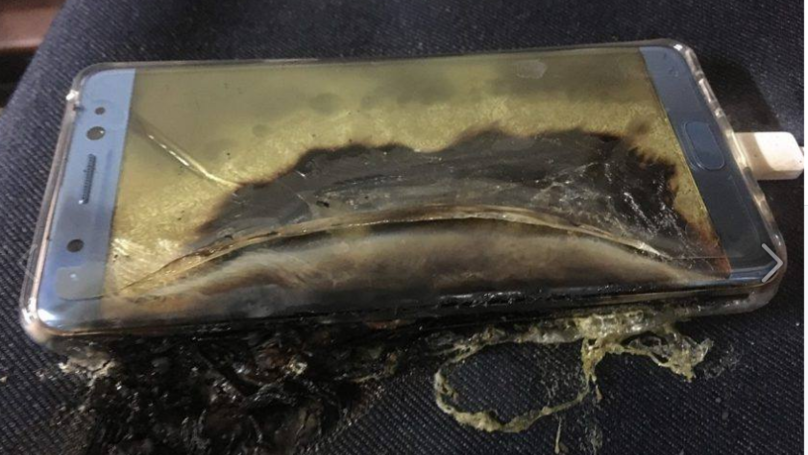Samsung Galaxy Note 7 banned from flights as officials fear it might cause planes to catch fire
The phones shouldn’t be put into bags because of ‘recent incidents and concerns’, the Federal Aviation Authority said in an extremely rare warning

US authorities have taken the almost unprecedented step of telling airline passengers not to take new Samsung phones with them on flights in case they set planes on fire.
The Federal Aviation Authority has warned passengers not to turn on or charge their phones because of concerns about the devices. It has also told passengers not to put their phones in their checked bags.
It is one of the first times that the FAA has warned people about a specific device, this time referring to the new Galaxy Note 7.
Exploded Samsung Galaxy Note 7 - in pictures
Show all 7The warning followed a global recall of the phone, after reports that they spontaneously exploded. Samsung investigated the problems and found that the rechargeable batteries inside the phones were at fault.
In one case, a family in St Petersburg, Florida, reported a Galaxy Note 7 phone left charging in their Jeep caught fire, destroying the vehicle.
Australian airline companies were among the first to take measures.
Qantas has asked passengers not to switch the Note 7 devices on and not to charge them during flights, its spokeswoman Sharna Rhys-Jones said.
Media reports said other Australian airlines took a similar step, including Jetstar Airways and Virgin Australia.
Samsung launched the latest version of the Note series in August.
The Note series is one of the most expensive line-ups released by Samsung, and the devices usually inherit designs and features of the Galaxy S phones that debut in the spring.
Samsung also added an iris scanner to the Note 7, which detects patterns in users' eyes to unlock the phone.
Before the issue of battery explosions emerged, supplies were not keeping up with higher-than-expected demand for the smartphone.
The Note 7 is not the only gadget to catch fire thanks to lithium-battery problems, which have afflicted everything from laptops to Tesla cars to Boeing's 787 jetliner.
Rechargeable lithium batteries are more susceptible to overheating than other types of batteries if they are exposed to high temperatures, are damaged or have manufacturing flaws.
Once the overheating starts, it can lead to "thermal runaway" in which temperatures continue escalating to very high levels.
Water can extinguish the flames, but does not always halt the thermal runaway. Flames will often reappear after initially being quenched.
Lithium batteries are ubiquitous in consumer electronic devices. Manufacturers like them because they weigh less and pack considerably more energy into the same space than other types of batteries.
Earlier this year, the International Civil Aviation Organisation, a UN agency that sets global aviation safety standards, banned bulk shipments of rechargeable lithium-ion batteries as cargo on passenger planes until better packaging can be developed to prevent a fire from spreading and potentially destroying the plane.
Additional reporting by Press Association
Subscribe to Independent Premium to bookmark this article
Want to bookmark your favourite articles and stories to read or reference later? Start your Independent Premium subscription today.

Join our commenting forum
Join thought-provoking conversations, follow other Independent readers and see their replies